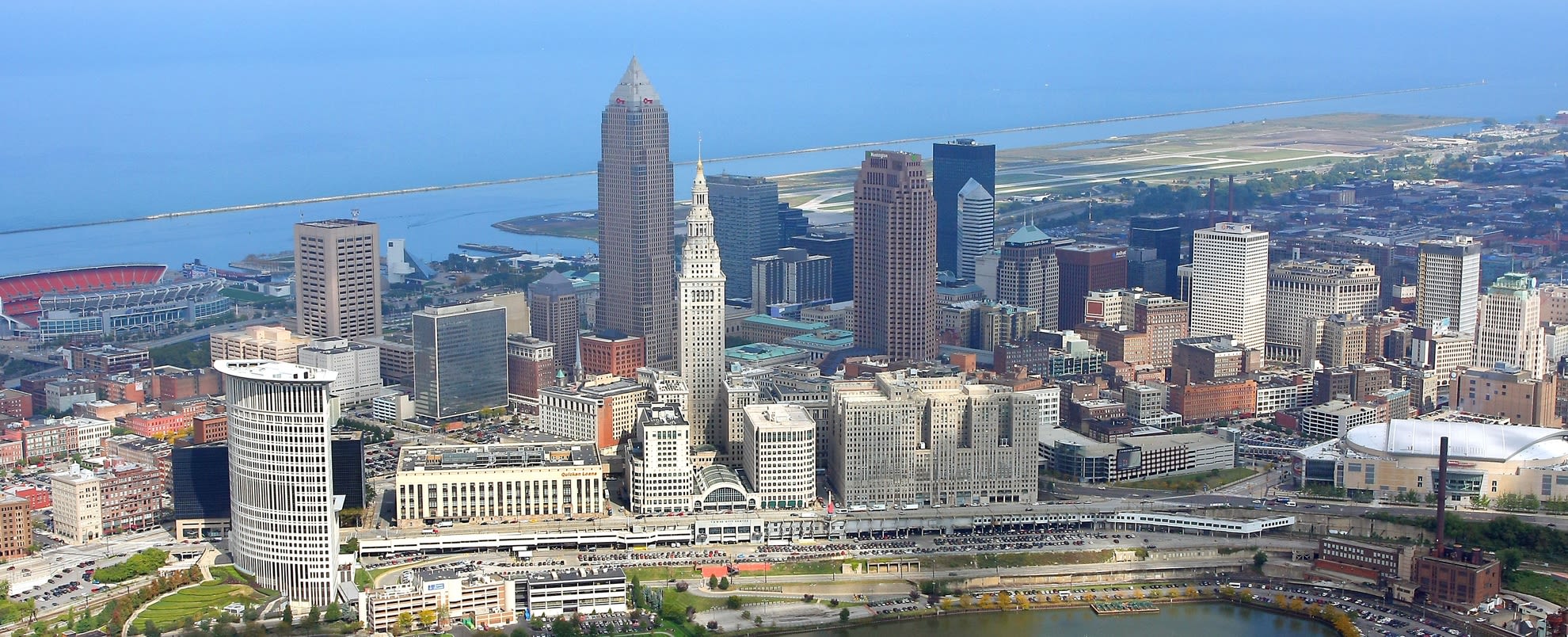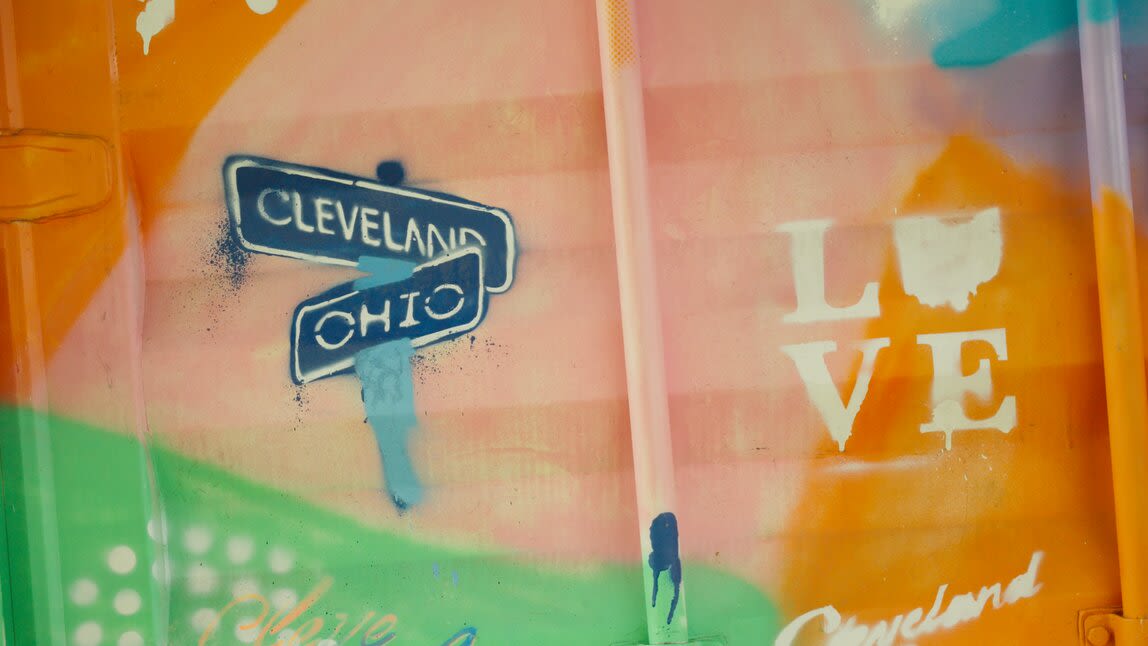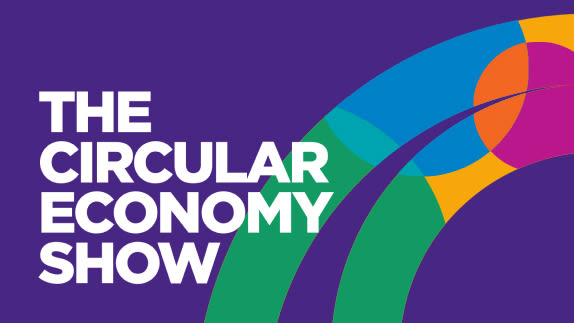In Cleveland, Ohio, a partnership between the City of Cleveland and local nonprofits—Cleveland Neighborhood Progress and Neighborhood Connections—has successfully mobilized community actors and grassroots action to drive its circular economy agenda, implemented key initiatives, and created lasting change through collaborative efforts. By using an inclusive approach that engages local residents, community organizations, and leaders across public, private and civic institutions, the city transformed its sustainability efforts into a movement focused on reducing waste, promoting reuse, and fostering resource-sharing. The lessons learned from Cleveland’s journey provide valuable guidance for any city looking to institutionalize circular economy principles whilst simultaneously empowering its community.
How it started
Cleveland’s circular economycircular economyA systems solution framework that tackles global challenges like climate change, biodiversity loss, waste, and pollution. It is based on three principles, driven by design: eliminate waste and pollution, circulate products and materials (at their highest value), and regenerate nature. journey is deeply rooted in years of collaboration between the city, local organizations, and community leaders. The foundation for this effort was laid during the city’s Sustainable Cleveland 2019 initiative, which ran from 2009 to 2019 and annually focused on various sustainability goals, including the Celebration Year of Zero Waste in 2014. These initiatives created an environment where community members, grassroots organizations, and local institutions collaborated to embed sustainability across the city.
In 2018, however, Cleveland’s recycling program was abruptly halted due to high contamination rates. In 2019, as the Sustainable Cleveland initiative reached its culmination, city leaders and community partners recognised this as a critical moment to rethink the city’s approach to waste management. Leaders across the city saw an opportunity to expand beyond traditional recycling, and to explore circular economy strategies to support waste reduction, reusereuseThe repeated use of a product or component for its intended purpose without significant modification., and encourage local economic development whilst also meeting the city’s climate goals.
In 2020, with support from a grant by the Robert Wood Johnson Foundation, Cleveland Neighborhood Progress, the City of Cleveland, and Neighborhood Connections launched the Circular Cleveland initiative. This initiative aimed to unify and amplify the city's circular economy efforts under a singular banner. Designed as a comprehensive and community-centered approach, the initiative aims to mitigate climate change impacts, foster new economic opportunities, and strengthen community resilience through the adoption of circular economy principles.
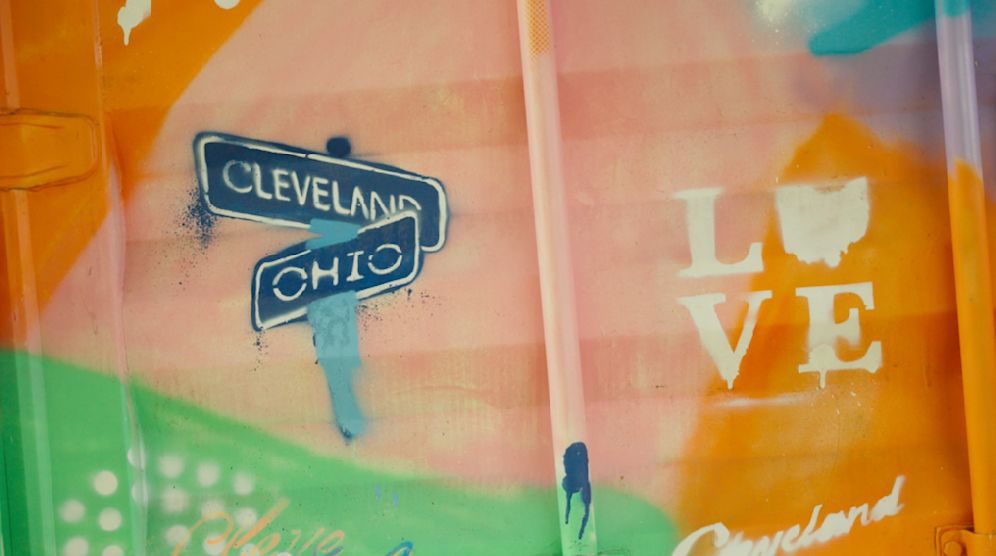
The role of community actors
Since 2003, Cleveland Neighborhood Progress and Neighborhood Connections have supported several grassroots initiatives including many that embodied circular economy principles, even if they didn't explicitly use that terminology. These organizations have historically worked closely with the City of Cleveland, which has funded various initiatives and projects in collaboration with them. As a local intermediary, Cleveland Neighborhood Progress, has worked closely with the City of Cleveland to launch and implement several initiatives that require a neighborhood-based approach. The initiative’s objective was to bring community members into the decision-making process, ensuring that the City’s circular economy program was shaped by residents’ needs and aligned with city-wide strategies.
The initiative recognised that community actors were already the driving force behind circular economy initiatives and that genuine change could only occur with active participation from local residents and community organizations in developing and implementing solutions. Cleveland Neighborhood Progress and Neighborhood Connections helped to bridge the divide between policy and practice by empowering community voices to be heard and their ideas included in city decision-making, fostering a foundation of community resilience. Their leadership has ensured that the circular economy is not merely a top-down mandate but a movement driven by the community, with residents actively participating in the development and success of local projects. This collaborative approach has instilled a sense of ownership and pride among residents and community organizations, who feel they are directly contributing to the city's sustainability objectives.
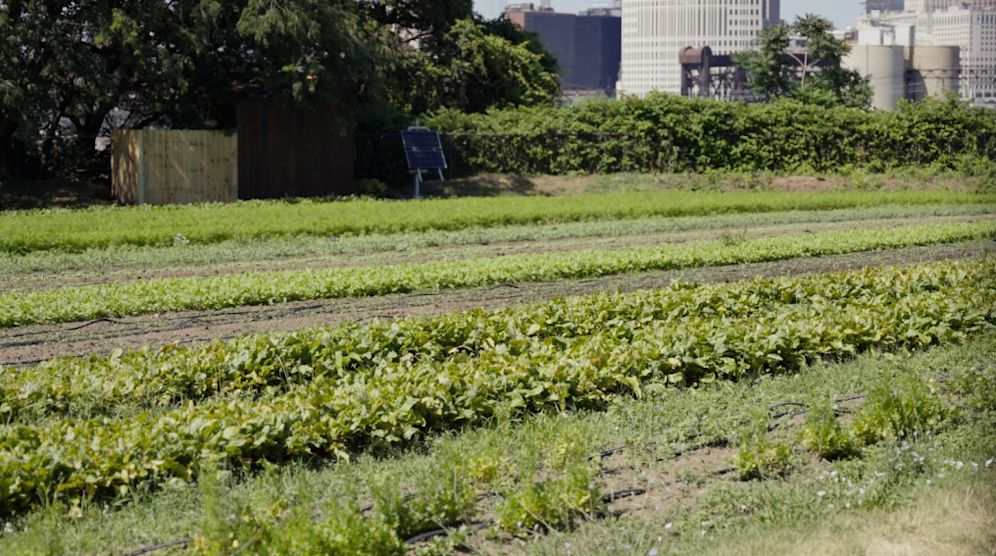
Key activities and initiatives
Several key activities and initiatives helped Cleveland engage community actors and drive the circular economy forward:
Circular Cleveland Ambassador Program: Cleveland's innovative Ambassador program positioned residents at the forefront of the city's shift toward a circular economy. Community leaders were selected for their diverse networks, geographic representation, and ability to engage with a wide range of people, serving as vital bridges between the Circular Cleveland leadership and local communities. Going beyond traditional community engagement, these Ambassadors played instrumental roles in both crafting the city's circular economy roadmap and stewarding community resources through their various community projects in their neighborhoods.
Community grants: Since April 2021, grassroots circular innovation was catalyzed by awarding more than $70,000 to over 37 diverse organizations across the city. A local committee of resident grantmakers engaged in neighborhood initiatives selected recipients based on their neighborhood connections, alignment with circular principles, and potential for project replication. These awards empowered local changemakers - many first-time grant recipients - to pioneer circular solutions in their communities. The funded initiatives focused on four key areas: food systems transformation through community gardens, food rescue, and compostingcompostingMicrobial breakdown of organic matter in the presence of oxygen., textile reuse and upcycling programmes, innovative waste reduction and recycling services and skills development and community education. In addition, Circular Cleveland Ambassadors were provided one-time dedicated small grants to advance circular economy concepts in their neighborhoods through workshops, events and engagement projects.
Composting pilot: Through funding from the Robert Wood Johnson Foundation the City launched its first composting program at West Side Market in partnership with Rust Belt Riders and the Hunger Network. This initiative includes a food rescue programme that redistributes surplus edible food to local organizations supporting those in need, and diverts food waste for composting to enrich soil at local farms. After a successful pilot, composting is now part of the Market’s regular operations.
Circular Cleveland Roadmap and Implementation Plan: The City of Cleveland and Cleveland Neighborhood Progress collaborated with a team of international experts to develop a Circular Cleveland Roadmap for the city. A detailed landscape analysis assessed the flow of materials, energy, and water across Cleveland’s industrial, commercial, residential, and transportation sectors, and established a baseline, pinpointing data gaps and revealing high-impact areas for change. Guided by input from stakeholders, the Roadmap identifies four strategic areas: manufacturing, remediating pollution, the built environment, and getting more value from resources.
Economic development grants: Circular Cleveland has actively supported innovative solutions to waste and pollution through various grant initiatives.
Circular Cleveland partnered with SCORE Cleveland, a non-profit specializing in business mentorship for entrepreneurs and startups, to launch three business incubation grants. Each grant, valued at $10,000, was designed to support small businesses and entrepreneurs developing innovative solutions to material waste and pollution using circular economy principles.
Circular Cleveland collaborated with MAGNET, a manufacturing advocacy non-profit, to award a $10,000 prize for circular and sustainable innovation as part of MAGNET's annual pitch competition.
Cleveland Central Kitchen, a food business incubator, was awarded a $30,000 incentive to reduce food waste. The funding is being used to study food waste streams and develop value-added processes to repurpose byproducts currently sent to landfills. One of the hub’s key projects involves creating fruit vinegar from large quantities of fruit pulp generated by a member business. Another project is investing in food processing equipment to expand the farm surplus recovery program that partners with Northeast Ohio farms to turn surplus produce into organic products used by member businesses and a local school districts.
A total of $30,000 was allocated to develop a webinar series designed to help small and medium-sized enterprises (SMEs) adopt circular practices. The funding also supported five businesses through micro-grants, enabling them to enhance their waste and materials management efforts following participation in the webinar series.
Examples of community initiatives
Rid-All Green Partnership (Urban Farm)
“The Rid-All Green Partnership is pumping energy, vibrancy, and opportunity into the Cleveland community, providing food access, training, and hope to citizens.” - Randell McShepard, Co-Founder
About
Rid-All Green Partnership is an urban agriculture and environmental stewardship organization dedicated to transforming lives and landscapes through urban farming. Located in Cleveland, Ohio, Rid-All grows fresh vegetables, offers urban agriculture classes, and encourages healthy eating habits among community members of all ages. The organization also runs a Class II EPA-licensed compost facility, operates a tree nursery, and hosts a farmers market open seven days a week, providing fresh produce and fostering local food access.
How is it circular? Rid-All Green Partnership exemplifies circular principles through a closed-loop system of food waste management and resource renewal. By collecting food waste from the Cleveland Food Bank and local grocery stores, the organization prevents landfill waste and transforms it into compost. This compost enriches the soil to grow vegetables, which are sold at the farmers' market. Unsold produce is returned to the compost pile, continuing the cycle of reuse and minimizing waste.
Benefits
For the city: Rid-All has created 18 local jobs and revitalized 18 acres of abandoned vacant lots in one of the most distressed parts of the city, turning it into productive, green urban farmland. It has expanded green space for public recreation, and improved access to healthy food for Cleveland residents, enhancing the overall sustainability and well-being of the city.
For the community: The organization brings substantial benefits to the local community, including providing fresh, nutritious food options at the Rid-All Community Kitchen, offering agricultural training programs, and promoting health and wellness among residents.
Visit www.ridall.org for more information.
Rust Belt Riders
“With the support of the City of Cleveland, we have been able to expand our services to seven new residential drop-off sites!” - Robert Kurtz, Commercial Solutions, Worker Owner
About
Rust Belt Riders is a worker-owned cooperative dedicated to sustainable waste management, focusing on reducing food waste in Cleveland. The organization collaborates with businesses, schools, restaurants, and other groups to collect food scraps and convert them into nutrient-rich soil through composting. This compost, in turn, supports local agriculture and gardening efforts, enriching the community with high-quality soil blends. Their mission, “Feed People, Not Landfills,” reflects their commitment to transforming food waste into a valuable resource for Cleveland residents.
How is it circular?
Rust Belt Riders divert food scraps from landfills which are composted, sequestering carbon into the soil, improving soil health and helping to remediate environmental damage. By returning organic material to the soil, the organization creates a sustainable loop that reduces waste, supports local agriculture, and fosters environmental resilience.
Benefits
For the city: In 2023, Rust Belt Riders processed over 6.4 million pounds of food scraps to valuable compost, diverting food waste from landfill and reducing greenhouse gas emissions by more than 2,300 tonnes of CO2e. The organization employs 32 team members and has expanded service to seven new residential drop-off sites with the City of Cleveland’s support, promoting sustainable waste practices citywide.
For the community: Rust Belt Riders serves nearly 3,000 households and 300 businesses with weekly compost pick-up, showing a strong community commitment to sustainability. By providing convenient drop-off sites and composting services, they empower businesses and residents to reduce waste, improve local soil quality, and support urban agriculture.
Visit www.rustbeltriders.com for more information.
Cleveland Sews
“Cleveland Sews was founded through the support of Neighborhood Connections, and their spirit of community-building is resonant through our work.” - Sharie Renee, Founder and Director
About
Cleveland Sews is an education and workforce development program focused on sewing, circular manufacturing, and regenerative agriculture. The initiative supports Cuyahoga County residents by providing skill-building in sewn trades, fostering community, and encouraging sustainability. Through access to up-cycled materials and mentorship, Cleveland Sews empowers participants to learn sustainable practices, hone craftsmanship, and create products that benefit the local community, all while reinforcing hope and resilience within participants.
How is it circular?
Cleveland Sews promotes circular manufacturing by working with local manufacturers, businesses, and organizations to divert textile waste from landfills and repurpose these materials into new, innovative products. The program focuses on reducing waste through up-cycling, keeping valuable materials in circulation whilst reducing environmental impact and fostering creativity within the community. In 2024, Cleveland Sews diverted approximately 6 tonnes of textile material from landfills.
Benefits
For the city: The diversion of textile waste benefits Cleveland's educational landscape, as Cleveland Sews provides free up-cycled materials for inner-city educational programs, saving costs for organizations and individuals. The initiative enhances city sustainability efforts and contributes to a circular local economy by turning waste into resources.
For the community: Cleveland Sews strengthens the community by offering educational programming that fosters social connections, skill development, and community health. Activities such as Sew-A-Thons bring people together, building social networks while supporting health and wellness. Additionally, Cleveland Sews empowers residents with new skills and sustainable practices that improve personal and community resilience.
Visit www.clevelandsews.org or Instagram @clevelandsews for more information.
Fenwick Block Club: Neighbors Helping Neighbors
“The neighborhood is cleaner and safer now, and new skills have been learned.” - Kristy D. Fann
About
The Fenwick Block Club is a community-driven initiative that promotes neighborly support through various programs, including a free tool-sharing program. This initiative provides access to landscaping and power tools at no cost, allowing residents to maintain their properties without the financial burden of purchasing expensive equipment. Known as "The Shipping Container," this tool-sharing hub is managed by local volunteers and serves as a resource for one-third of the neighborhood. The Block Club also organizes bike repair clinics, helping residents keep bicycles in good working order and out of landfills.
How is it circular?
The tool-sharing program exemplifies circular economy principles by reducing the need for new equipment purchases, encouraging shared resource use, and minimizing waste. The shared tools reduce consumption and allow multiple households to benefit from one set of resources. Additionally, the Block Club’s bike repair clinics prevent bicycles from becoming landfill waste, promoting reuse and resourcefulness within the community.
Benefits
For the city: The tool-sharing program has reduced illegal dumping in the neighborhood by transforming an unused lot into a community resource. This has led to a cleaner, safer environment and has improved the walkability and beauty of the area, aligning with broader city goals of creating vibrant, sustainable neighborhoods.
For the community: Through access to shared tools, neighbors save money and gain skills in property maintenance and repair. The bike repair clinics foster sustainability and encourage outdoor activity. With support from NeighborUp Action Grants, the Fenwick Block Club has beautified the neighborhood, strengthened social ties, and promoted a spirit of collaboration and shared responsibility.
A major partner of the Block Club is the MetroWest Community Development Organization. Visit metrowestcle.org to find out more.
Rebuilders Xchange
“We’re building a dynamic, self-sustaining economy of people using reclaimed building materials, proudly founded in Cleveland and scaling for other cities ” - Jessica Davis, Founder
About
Rebuilders Xchange (RBX) is Cleveland's hub for reclaimed construction materials, connecting salvaged resources with creative reuse opportunities while building economic resilience through a network of 900+ vendors. The organization's main goals focus on diverting reusable materials from landfills, creating income opportunities for local vendors, and promoting sustainable building practices through reclaimed materials. RBX achieves this through comprehensive salvage services, marketplace operations, custom fabrication using recycled resources, community education programs, and extensive vendor partnerships that transform potential waste into valuable materials.
How is it circular?
RBX extends the life cycle of building materials and furniture through reclamation, resale, and repurposing, thereby reducing waste and conserving resources. Its core activities focus on sourcing materials from deconstruction projects, salvaging and reselling items from residential and commercial spaces, and creating a marketplace for vendors to sell reusable materials, keeping these items in use and out of landfills. Additionally, it promotes circularity by offering fabrication services that transform reclaimed materials into new products and by educating the community on sustainable, resource-efficient practices.
Benefits
For the city: In 2023, RBX diverted tons of reusable materials from landfills, significantly reducing waste and associated emissions. Rebuilders Xchange created a marketplace for construction waste. It has supported 900+ vendors, creating income opportunities and saving the community thousands of dollars by providing affordable reclaimed materials for construction and creative projects.
For the community: RBX has created a new circular economy that empowers communities to generate wealth from reclaimed, reused, and repurposed building materials, moving beyond traditional donation-based models. Participants can both save and make money, gain access to unique and affordable building materials, and build skills in sustainable practices, collectively strengthening community resilience and fostering shared economic growth.
Visit www.instagram.com/rbxcle for more information.
Major achievements
The circular economy has been institutionalized in the city administration: Cleveland's circular economy initiative has achieved meaningful environmental and social impacts, establishing itself as a vital part of the city’s long-term urban planning. Now a reference point in city reports, the circular economy is embedded in the city’s 10-Year Strategic Plan. Plans are also underway to incorporate circular economy principles into upcoming updates to the city’s Climate Action Plan and Municipal Action Plan. Circular Cleveland has also led to the institutionalization of the circular economy within the city through the creation of a dedicated position: a Sustainability Senior Manager for the Circular Economy, further embedding circularity into Cleveland’s future. Additionally, a notable outcome of the Ambassador program is the hiring of one participant by the City of Cleveland’s Public Works Department as community outreach staff for the Division of Waste Collection and Disposal’s recycling program.
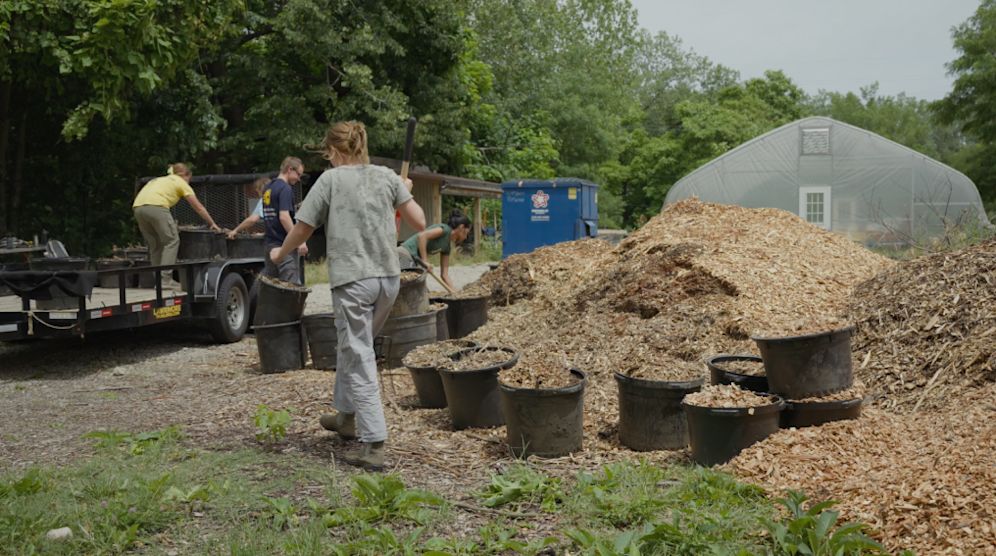
Composting is being scaled up across the city: Cleveland's composting initiative is scaling up dramatically, evolving from a focused pilot at West Side Market to include a programme for residents. The City has attracted significant federal support through a $341,000 USDA grant, enabling a major expansion from 7 to 17 drop-off sites across the city. Rid-All Green Partnership's 18-acre Kinsman farm will serve as both a composting hub and training center. The initiative will also create green job opportunities, with Ohio Means Jobs contributing $20,000 for workforce development and Cuyahoga County Solid Waste District offering in-kind support valued at $35,000 in educational resources and assistance. Building on the model of the Circular Cleveland Ambassador program, Composting Ambassadors will be designated for each neighborhood. These individuals will receive a small stipend and play a key role in promoting and supporting efficient composting practices within their communities.
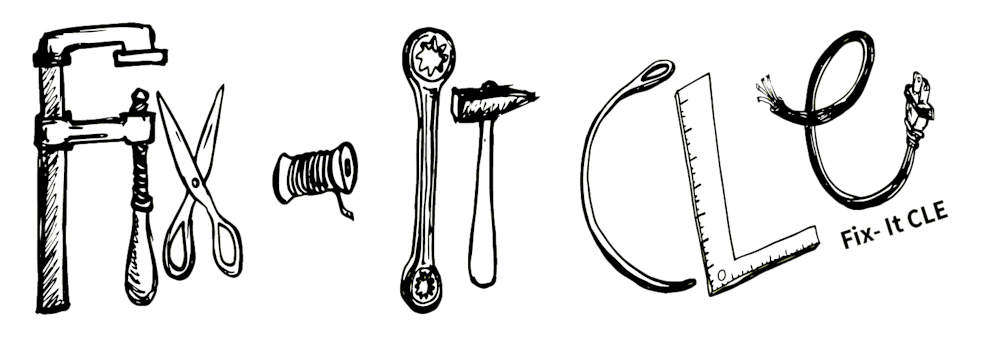
Fix-it CLE Repair Workshops are being run as an ongoing partnership: Fix-it CLE Repair Workshops were established as a result of Circular Cleveland. Residents are encouraged to bring broken items to the workshops and work with volunteer repairrepairOperation by which a faulty or broken product or component is returned back to a usable state to fulfil its intended use. coaches to fix them. From March to October, the Cleveland Public Library hosts a workshop on the 3rd Saturday of every month at rotating branches. In 2024, nine workshops were held across different neighborhoods, facilitated by 20 volunteer repair coaches.
Case Western Reserve University’s (CWRU) Sears think[box], a six-floor maker space open free of charge to both students and the public, hosts a workshop on the fourth Monday of every month. Additionally, the Cuyahoga County Solid Waste District has organized two Reduce, Reuse, Repair Fairs. The workshops and fairs feature skilled coaches from diverse backgrounds, including electricians, mechanics, sewists, and carpenters. Hundreds of patrons have attended, bringing a wide array of items needing repair, such as lamps, laptops, smartphones, fans, vacuums, small kitchen appliances, as well as clothing and accessories. Bicycle repair services provided by the libraries have been particularly successful in engaging the broader community, especially families. A significant outcome of these workshops has been the development of a repair ecosystem. Some patrons who initially came to repair items gained enough skills and confidence to eventually become repair coaches themselves. The inclusion of an onsite tool library for coaches and patrons has been especially valuable, providing necessary resources to facilitate repairs.
Project funding and structure
Cleveland Neighborhood Progress received $476,000 from the Robert Wood Johnson Foundation, which supported the initiative's core components. The grant covered stipends for the ambassador program, supported the composting pilot, and provided for three consultants to conduct the landscape analysis and develop the city’s circular economy roadmap. Additionally, it funded both the economic development and community grants.
The Circular Cleveland initiative was a joint initiative of Cleveland Neighborhood Progress and the City of Cleveland. It was structured with clear roles for the project partners, maximizing expertise and community impact. Project and partnership management was led by Cleveland Neighborhood Progress, which also oversaw the ambassador programme, implemented economic development grants and co-led the development of the comprehensive Circular Cleveland Roadmap with the City of Cleveland. Neighborhood Connections facilitated the community grants program, and the City led the West Side Market composting pilot and the economic development grants.
Insights and learnings
Cleveland’s experience offers several valuable insights for other cities looking to leverage community actors to catalyze a circular economy:
Community engagement accelerates progress: Cleveland's circular economy transformation flourished because of its deep community roots. By actively empowering residents and community organizations to participate in decision-making, the city developed a circular economy programme that is both practical and embraced by the community. This inclusive approach cultivated shared ownership of environmental goals, turning abstract sustainability targets into concrete community achievements.
Consistent communication is key to driving change: A clear and consistent communication strategy is essential for building and sustaining momentum for a new initiative. The multi-sector and community collaboration established during the development of the roadmap—along with the small grants and ambassador programs—sparked strong demand for additional knowledge and resources among stakeholders. Communication could have been improved by tailoring communication channels and messaging to resonate with the specific needs and interests of each audience. Equally important is timing communications strategically to align with each phase of the project.
Local partnerships are critical to achieving meaningful community impact: The success of the Fix-It CLE Repair Workshops has been driven by the invaluable contributions, resources, and dedication of local partners, including the Cleveland Public Library, CWRU's Sears think[box], and the Cuyahoga County Solid Waste District.
